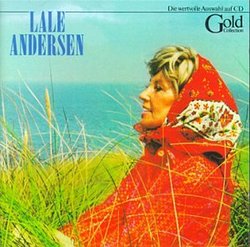| All Artists: Lale Andersen Title: Gold Collection Members Wishing: 0 Total Copies: 0 Label: EMI Release Date: 11/12/1998 Album Type: Import Genres: International Music, Broadway & Vocalists Style: Musicals Number of Discs: 1 SwapaCD Credits: 1 UPC: 077779005925 |
Search - Lale Andersen :: Gold Collection
 | Lale Andersen Gold Collection Genres: International Music, Broadway & Vocalists
|
Larger Image |
CD Details |
CD ReviewsNot the full German version of Lili Marleen! Zub | 06/15/2004 (3 out of 5 stars) "I was hoping that this recording would have "Lili Marleen" entirely in German, but it doesn't. Instead, she sings one verse each in English, French, and German. If you are not familiar with Lale Andersen, I should warn you that she has a habit of really accenting the ending "t" sound of a word. Her style is similar to Marlene Dietrich, but maybe a little better. (Marlene never had much of a voice.)" Decent compilation but not the original "Lili Marleen" Zub | Forks Twp., PA | 02/23/2007 (3 out of 5 stars) "This collection of Andersen's music is a basic gathering of her later recordings along with rerecordings of some of her older tunes. In 1961, "Ein Schiff Wird Kommen", her German vocal version of "Never On Sunday", briefly dented the American top-100 pop charts. American listeners will likely also recognize in the hauntingly melodic "Grau War Der Ozean", the tune that Brenda Lee took into the top 10 as "Losing You". Andersen's claim to fame however, is her recording of "Lili Marleen", a tune that became famous during World War II both on the German and Allied sides. For obvious political reasons, an English-language version of the song was made to counteract any possible positive notions toward the Germans that the popular tune may have had on the Allied forces. Andersen rerecorded "Lili Marleen" numerous times during her career and the version presented here, a disappointment to some, is the tri-lingual 60's version, not the original 1939 recording. This substitution may to due to the fact that a noisy, disc dub from the '30's may sound too primitive next to the relatively modern stereo recordings found throughout this CD. As noted above, a few other tracks (4,12,13) are also 60's rerecordings of older Andersen tunes. On the positive side, all the tracks are fairly clean, full-frequency stereo and play well on modern equipment. For those seeking the original version of "Lili Marleen", it is difficult to determine which version appears on any particular CD. At least two collections, however, to the best knowledge of this reviewer, do contain the 1939 recording, those being a 1999 self-titled CD on the XYZ label and another EMI compilation from 1996 titled "Das Beste Von...". Finding either of these out-of-print CD's is the challange. Given the fame of this recording however, it should not be out of reach of the CD buying public for long. Despite its perceived shortcomings - the rerecordings, the minimal liner notes - this piece does provide a rewarding overview of the music of the at once famous and obscure Lale Andersen."
|

 Track Listings (16) - Disc #1
Track Listings (16) - Disc #1